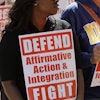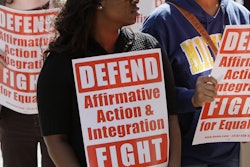Houston
Waning political support for
affirmative action poses new obstacles for
advocates and equal opportunity officers, leaders
of the American Association for Affirmative
Action (AAAA) said here in April at their
annual conference.
Association members, many of whom are
affirmative action and equal opportunity
officers at public institutions, were urged to
educate and organize their employers and the
public to defend the policy that many say has
helped women and minorities increase access to
jobs and education in the past thirty years.
“Our members are looking to us to help
them continue to justify their own existence. It
was difficult for some people to be able to
come to this conference because it was
affirmative action, though that is what they
do,” said Ruth Jones, president of the
1,000-member association and director of equal
opportunity at Old Dominion University.
Approximately half of the membership works in
higher education.
According to Jones, conflicting legal
interpretations of judicial rulings on affirmative
action programs have placed association
members in a difficult position.
“Who do you think the president of a
university is going to listen to — an affirmative
action officer or the senior legal counsel?” asked
Jones.
Many of the 260 conference participants
were reeling from prominent political and
judicial setbacks last year including the passage
of Proposition 209 in California, which bans
affirmative action in public institutions, and the
Hopwood decision, which bans affirmative
action at Texas colleges and universities. Texas is the only
state in the nation under a court order that bans
affirmative action at public colleges and
universities.
Last year’s decision by the Fifth Circuit
Court of Appeals was discussed at keynote
sessions because some universities outside of the
Fifth Circuit are using decision to dismantle their
affirmative action programs, even though the
court only has jurisdiction over Texas,
Mississippi, and Louisiana.
“Every state suddenly thinks it’s in the Fifth
Circuit,” said Barbara Arnwine, executive
director of the Lawyers’ Committee for Civil
Rights Under Law and one of six keynote
speakers at the conference.
Many conference sessions focused on
strategies to defend affirmative action — from
how to explain the importance of policy in the
workplace to how to organize voters to defeat
initiatives and legislation.
According to Jones, affirmative action
supports have been lax in educating the public
about the issue, “So now,” she noted, “people
can make it whatever they want it to be. We
have to continue to educate the next
generation.”
The first step toward winning the
affirmative action debate is taking back the
language, said Barry Shapiro, a regional director
with the association and a diversity consultant:
“So long as the opposition describes affirmative
action as preferences, the best we can do is tie
and the worst we can do is lose.
“We need to do our public relations work on
the principles of affirmative action,” he
continued. “Stop the process by which it is
mischaracterized by misinformation. And we
need to start connecting with groups in our
community who have a vital interest in
defending affirmative action.”
Dr. Anthony Pratkanis, an associate
professor of psychology at the University of
California at Santa Cruz and a presenter at the
conference, said, “To sell affirmative action, we
have to tell people that it’s not preferential
selection and it’s not quotas. From my
perspective, we haven’t done a very good job of
that. And we haven’t been
doing a very good job of explaining the
barriers that are erected to keep people from
achieving.”
Few people realize that many minority
students in California attend high schools that
do not offer college advanced placement
courses, which allow students to receive more
grade point credits and increase their chances
of meeting academic admission standards at
the state’s best university system.
U.S. Rep. Sheila Jackson Lee (D-Texas)
said supporters have to explain the history of
past discrimination to defend affirmative
action today.
“The problem with the color-blind
interpretation, the problem with Hopwood, is
that they don’t recognize that we cannot take
away the past,” Jackson Lee said.
Jackson Lee added that affirmative action
opens the door to opportunity but does not
guarantee it. Drawing from her own experience
as a Yale University graduate, she said, “Let me
proudly say I am a product of affirmative
action. Yale went to affirmatively find us
— the first class of women. But I didn’t graduate
because of affirmative action.”
In the association’s recent newsletter,
Jones said the organization needs to increase
its visibility in the legislative arena, including
retaining a government relations firm to
monitor legislation and establishing a permanent
presence in Washington, D.C.
“I want to get this organization moving on
the grass-roots level,” said Ismael Rivera
Jr., first vice
president of AAAA
and chairman of its
legislative
committee.
Rivera proposed
networks in each
state that could
respond swiftly to
anti-affirmative
action measures, since many efforts to dismantle the
programs are at a state level. He said that it is
difficult to track anti-affirmative action
legislation in Congress or state legislatures
because sponsors include items as riders attached
to bills that appear to have nothing to do with
affirmative action.
The good news is that anti-affirmative
action bills in six states have failed to clear
legislative committees, according to Rivera, who
is a member of the human resources operations
at the American Psychological Association.
“I think that’s something worth talking
about,” he said.
Affirmative action supporters also should
learn to look for loopholes in legislation,
including whether it would invalidate a court
order or result in the loss of federal funds, Rivera
said.
Arnwine and Shapiro, who co-presented a
workshop on Hopwood and Proposition 209,
said that, given more time and money,
opponents of Proposition 209 could have
succeeded in defeating the proposition. With $3
million and a door-to-door campaign targeting
minority voters, opponents reduced support for
the proposition from 78 percent in pre-election
polls to 54 percent by election day, Shapiro said.
The proposition has not been implemented
because of legal appeals.
“Don’t believe the hype. People can be won
over if you do the work,” Arnwine said.
The location of the association’s
twenty-third annual conference tied into the recent
squabble between Texas Attorney General Dan
Morales and Norma Cantu, assistant education
secretary for the Office for Civil Rights, over
the interpretation of Hopwood, which
originated at the University of Texas School of
Law and banned the use of race in admissions.
The conflict apparently ended when Cantu
backed down from her previous position that
the U.S. Supreme Court’s Bakke decision had
precedence over Hopwood. In the 1978 Bakke
decision, justices allowed race as a criterion in
college admissions in the interest of diversity.
Cantu and Morales declined invitations to
address the conference. However, their absence
did not escape notice. During her speech,
Jackson Lee made references to their
disagreement and told conference participants,
“I want you to go home and
say, `Bakke is the law of the land.'”
COPYRIGHT 1997 Cox, Matthews & Associates
© Copyright 2005 by DiverseEducation.com















